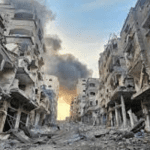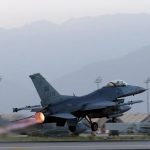Jordan has stated that it will not sign an agreement to provide energy to Israel in exchange for water, which was scheduled to be ratified last month.
Jordanian Foreign Minister Ayman Safadi said the country will no longer sign the agreement as a result of the Israel-Hamas conflict.
“Can you imagine a Jordanian minister signing a water and electricity agreement alongside an Israeli minister, all while Israel continues to kill children in Gaza?” asked Jordan’s top diplomat, whose country borders Israel to the east.
Jordan and Israel have held a fragile peace agreement since 1994, which returned some 380km (236 miles) of Jordan’s occupied land from Israeli control and resolved long-standing water disputes.
“In 1994, Jordan signed the peace treaty as part of a larger Arab effort to establish a two-state solution.” That has not been accomplished. Instead, Israel has failed to uphold its end of the bargain.
This month, Jordan announced it was “immediately” recalling its Ambassador to Israel in response to the war in Gaza, accusing Israel of creating an “unprecedented humanitarian catastrophe”.
Mr Safadi said Jordan would never enter into a dialogue about who runs Gaza after the war, considering such a move now could be seen as a green light to Israel to do whatever it wants.
“If the international community wants to talk about this, it must stop the war now,” he added.
Jordan, like other Arab and Muslim countries, has strongly condemned Israel’s bombardment of Gaza in which more than 11,600 people have been killed, including more than 4,700 children. Israel has also launched a ground offensive and restricted supplies of water, food and electricity to the enclave.
Speaking at the same time as Safadi, Philippe Lazzarini, the head of UNRWA, warned of a “deliberate attempt to strangle” the organization’s operations in the Gaza Strip and that there is a risk that the organization will have to cease all humanitarian work due to a fuel shortage.
After Hamas fighters from Gaza attacked Southern Israel on October 7, Israel imposed a “complete siege” on the region and stopped fuel shipments into the Gaza Strip.
Jordan has stated that it will not sign an agreement to provide energy to Israel in exchange for water, which was scheduled to be ratified last month.
Jordanian Foreign Minister Ayman Safadi said the country will no longer sign the agreement as a result of the Israel-Hamas conflict.
“Can you imagine a Jordanian minister signing a water and electricity agreement alongside an Israeli minister, all while Israel continues to kill children in Gaza?” asked Jordan’s top diplomat, whose country borders Israel to the east.
Jordan and Israel have held a fragile peace agreement since 1994, which returned some 380km (236 miles) of Jordan’s occupied land from Israeli control and resolved long-standing water disputes.
“In 1994, Jordan signed the peace treaty as part of a larger Arab effort to establish a two-state solution.” That has not been accomplished. Instead, Israel has failed to uphold its end of the bargain.
This month, Jordan announced it was “immediately” recalling its Ambassador to Israel in response to the war in Gaza, accusing Israel of creating an “unprecedented humanitarian catastrophe”.
Mr Safadi said Jordan would never enter into a dialogue about who runs Gaza after the war, considering such a move now could be seen as a green light to Israel to do whatever it wants.
“If the international community wants to talk about this, it must stop the war now,” he added.
Jordan, like other Arab and Muslim countries, has strongly condemned Israel’s bombardment of Gaza in which more than 11,600 people have been killed, including more than 4,700 children. Israel has also launched a ground offensive and restricted supplies of water, food and electricity to the enclave.
Speaking at the same time as Safadi, Philippe Lazzarini, the head of UNRWA, warned of a “deliberate attempt to strangle” the organization’s operations in the Gaza Strip and that there is a risk that the organization will have to cease all humanitarian work due to a fuel shortage.
After Hamas fighters from Gaza attacked Southern Israel on October 7, Israel imposed a “complete siege” on the region and stopped fuel shipments into the Gaza Strip.
Jordan has stated that it will not sign an agreement to provide energy to Israel in exchange for water, which was scheduled to be ratified last month.
Jordanian Foreign Minister Ayman Safadi said the country will no longer sign the agreement as a result of the Israel-Hamas conflict.
“Can you imagine a Jordanian minister signing a water and electricity agreement alongside an Israeli minister, all while Israel continues to kill children in Gaza?” asked Jordan’s top diplomat, whose country borders Israel to the east.
Jordan and Israel have held a fragile peace agreement since 1994, which returned some 380km (236 miles) of Jordan’s occupied land from Israeli control and resolved long-standing water disputes.
“In 1994, Jordan signed the peace treaty as part of a larger Arab effort to establish a two-state solution.” That has not been accomplished. Instead, Israel has failed to uphold its end of the bargain.
This month, Jordan announced it was “immediately” recalling its Ambassador to Israel in response to the war in Gaza, accusing Israel of creating an “unprecedented humanitarian catastrophe”.
Mr Safadi said Jordan would never enter into a dialogue about who runs Gaza after the war, considering such a move now could be seen as a green light to Israel to do whatever it wants.
“If the international community wants to talk about this, it must stop the war now,” he added.
Jordan, like other Arab and Muslim countries, has strongly condemned Israel’s bombardment of Gaza in which more than 11,600 people have been killed, including more than 4,700 children. Israel has also launched a ground offensive and restricted supplies of water, food and electricity to the enclave.
Speaking at the same time as Safadi, Philippe Lazzarini, the head of UNRWA, warned of a “deliberate attempt to strangle” the organization’s operations in the Gaza Strip and that there is a risk that the organization will have to cease all humanitarian work due to a fuel shortage.
After Hamas fighters from Gaza attacked Southern Israel on October 7, Israel imposed a “complete siege” on the region and stopped fuel shipments into the Gaza Strip.
Jordan has stated that it will not sign an agreement to provide energy to Israel in exchange for water, which was scheduled to be ratified last month.
Jordanian Foreign Minister Ayman Safadi said the country will no longer sign the agreement as a result of the Israel-Hamas conflict.
“Can you imagine a Jordanian minister signing a water and electricity agreement alongside an Israeli minister, all while Israel continues to kill children in Gaza?” asked Jordan’s top diplomat, whose country borders Israel to the east.
Jordan and Israel have held a fragile peace agreement since 1994, which returned some 380km (236 miles) of Jordan’s occupied land from Israeli control and resolved long-standing water disputes.
“In 1994, Jordan signed the peace treaty as part of a larger Arab effort to establish a two-state solution.” That has not been accomplished. Instead, Israel has failed to uphold its end of the bargain.
This month, Jordan announced it was “immediately” recalling its Ambassador to Israel in response to the war in Gaza, accusing Israel of creating an “unprecedented humanitarian catastrophe”.
Mr Safadi said Jordan would never enter into a dialogue about who runs Gaza after the war, considering such a move now could be seen as a green light to Israel to do whatever it wants.
“If the international community wants to talk about this, it must stop the war now,” he added.
Jordan, like other Arab and Muslim countries, has strongly condemned Israel’s bombardment of Gaza in which more than 11,600 people have been killed, including more than 4,700 children. Israel has also launched a ground offensive and restricted supplies of water, food and electricity to the enclave.
Speaking at the same time as Safadi, Philippe Lazzarini, the head of UNRWA, warned of a “deliberate attempt to strangle” the organization’s operations in the Gaza Strip and that there is a risk that the organization will have to cease all humanitarian work due to a fuel shortage.
After Hamas fighters from Gaza attacked Southern Israel on October 7, Israel imposed a “complete siege” on the region and stopped fuel shipments into the Gaza Strip.
Jordan has stated that it will not sign an agreement to provide energy to Israel in exchange for water, which was scheduled to be ratified last month.
Jordanian Foreign Minister Ayman Safadi said the country will no longer sign the agreement as a result of the Israel-Hamas conflict.
“Can you imagine a Jordanian minister signing a water and electricity agreement alongside an Israeli minister, all while Israel continues to kill children in Gaza?” asked Jordan’s top diplomat, whose country borders Israel to the east.
Jordan and Israel have held a fragile peace agreement since 1994, which returned some 380km (236 miles) of Jordan’s occupied land from Israeli control and resolved long-standing water disputes.
“In 1994, Jordan signed the peace treaty as part of a larger Arab effort to establish a two-state solution.” That has not been accomplished. Instead, Israel has failed to uphold its end of the bargain.
This month, Jordan announced it was “immediately” recalling its Ambassador to Israel in response to the war in Gaza, accusing Israel of creating an “unprecedented humanitarian catastrophe”.
Mr Safadi said Jordan would never enter into a dialogue about who runs Gaza after the war, considering such a move now could be seen as a green light to Israel to do whatever it wants.
“If the international community wants to talk about this, it must stop the war now,” he added.
Jordan, like other Arab and Muslim countries, has strongly condemned Israel’s bombardment of Gaza in which more than 11,600 people have been killed, including more than 4,700 children. Israel has also launched a ground offensive and restricted supplies of water, food and electricity to the enclave.
Speaking at the same time as Safadi, Philippe Lazzarini, the head of UNRWA, warned of a “deliberate attempt to strangle” the organization’s operations in the Gaza Strip and that there is a risk that the organization will have to cease all humanitarian work due to a fuel shortage.
After Hamas fighters from Gaza attacked Southern Israel on October 7, Israel imposed a “complete siege” on the region and stopped fuel shipments into the Gaza Strip.
Jordan has stated that it will not sign an agreement to provide energy to Israel in exchange for water, which was scheduled to be ratified last month.
Jordanian Foreign Minister Ayman Safadi said the country will no longer sign the agreement as a result of the Israel-Hamas conflict.
“Can you imagine a Jordanian minister signing a water and electricity agreement alongside an Israeli minister, all while Israel continues to kill children in Gaza?” asked Jordan’s top diplomat, whose country borders Israel to the east.
Jordan and Israel have held a fragile peace agreement since 1994, which returned some 380km (236 miles) of Jordan’s occupied land from Israeli control and resolved long-standing water disputes.
“In 1994, Jordan signed the peace treaty as part of a larger Arab effort to establish a two-state solution.” That has not been accomplished. Instead, Israel has failed to uphold its end of the bargain.
This month, Jordan announced it was “immediately” recalling its Ambassador to Israel in response to the war in Gaza, accusing Israel of creating an “unprecedented humanitarian catastrophe”.
Mr Safadi said Jordan would never enter into a dialogue about who runs Gaza after the war, considering such a move now could be seen as a green light to Israel to do whatever it wants.
“If the international community wants to talk about this, it must stop the war now,” he added.
Jordan, like other Arab and Muslim countries, has strongly condemned Israel’s bombardment of Gaza in which more than 11,600 people have been killed, including more than 4,700 children. Israel has also launched a ground offensive and restricted supplies of water, food and electricity to the enclave.
Speaking at the same time as Safadi, Philippe Lazzarini, the head of UNRWA, warned of a “deliberate attempt to strangle” the organization’s operations in the Gaza Strip and that there is a risk that the organization will have to cease all humanitarian work due to a fuel shortage.
After Hamas fighters from Gaza attacked Southern Israel on October 7, Israel imposed a “complete siege” on the region and stopped fuel shipments into the Gaza Strip.
Jordan has stated that it will not sign an agreement to provide energy to Israel in exchange for water, which was scheduled to be ratified last month.
Jordanian Foreign Minister Ayman Safadi said the country will no longer sign the agreement as a result of the Israel-Hamas conflict.
“Can you imagine a Jordanian minister signing a water and electricity agreement alongside an Israeli minister, all while Israel continues to kill children in Gaza?” asked Jordan’s top diplomat, whose country borders Israel to the east.
Jordan and Israel have held a fragile peace agreement since 1994, which returned some 380km (236 miles) of Jordan’s occupied land from Israeli control and resolved long-standing water disputes.
“In 1994, Jordan signed the peace treaty as part of a larger Arab effort to establish a two-state solution.” That has not been accomplished. Instead, Israel has failed to uphold its end of the bargain.
This month, Jordan announced it was “immediately” recalling its Ambassador to Israel in response to the war in Gaza, accusing Israel of creating an “unprecedented humanitarian catastrophe”.
Mr Safadi said Jordan would never enter into a dialogue about who runs Gaza after the war, considering such a move now could be seen as a green light to Israel to do whatever it wants.
“If the international community wants to talk about this, it must stop the war now,” he added.
Jordan, like other Arab and Muslim countries, has strongly condemned Israel’s bombardment of Gaza in which more than 11,600 people have been killed, including more than 4,700 children. Israel has also launched a ground offensive and restricted supplies of water, food and electricity to the enclave.
Speaking at the same time as Safadi, Philippe Lazzarini, the head of UNRWA, warned of a “deliberate attempt to strangle” the organization’s operations in the Gaza Strip and that there is a risk that the organization will have to cease all humanitarian work due to a fuel shortage.
After Hamas fighters from Gaza attacked Southern Israel on October 7, Israel imposed a “complete siege” on the region and stopped fuel shipments into the Gaza Strip.
Jordan has stated that it will not sign an agreement to provide energy to Israel in exchange for water, which was scheduled to be ratified last month.
Jordanian Foreign Minister Ayman Safadi said the country will no longer sign the agreement as a result of the Israel-Hamas conflict.
“Can you imagine a Jordanian minister signing a water and electricity agreement alongside an Israeli minister, all while Israel continues to kill children in Gaza?” asked Jordan’s top diplomat, whose country borders Israel to the east.
Jordan and Israel have held a fragile peace agreement since 1994, which returned some 380km (236 miles) of Jordan’s occupied land from Israeli control and resolved long-standing water disputes.
“In 1994, Jordan signed the peace treaty as part of a larger Arab effort to establish a two-state solution.” That has not been accomplished. Instead, Israel has failed to uphold its end of the bargain.
This month, Jordan announced it was “immediately” recalling its Ambassador to Israel in response to the war in Gaza, accusing Israel of creating an “unprecedented humanitarian catastrophe”.
Mr Safadi said Jordan would never enter into a dialogue about who runs Gaza after the war, considering such a move now could be seen as a green light to Israel to do whatever it wants.
“If the international community wants to talk about this, it must stop the war now,” he added.
Jordan, like other Arab and Muslim countries, has strongly condemned Israel’s bombardment of Gaza in which more than 11,600 people have been killed, including more than 4,700 children. Israel has also launched a ground offensive and restricted supplies of water, food and electricity to the enclave.
Speaking at the same time as Safadi, Philippe Lazzarini, the head of UNRWA, warned of a “deliberate attempt to strangle” the organization’s operations in the Gaza Strip and that there is a risk that the organization will have to cease all humanitarian work due to a fuel shortage.
After Hamas fighters from Gaza attacked Southern Israel on October 7, Israel imposed a “complete siege” on the region and stopped fuel shipments into the Gaza Strip.














